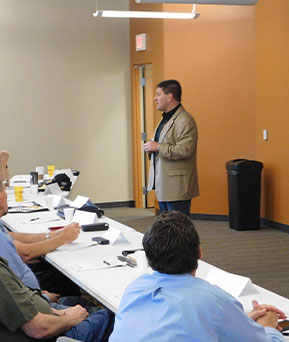2 hr. Workplace Violence Active Shooter Prevention & Response for Mgrs. & Supervisors
The objectives and topics covered during this training provide workplace leaders, administrators, supervisors, human resource personnel, security and front line personnel with information and strategies on recognizing and responding to the violent intruder.
If the event were to occur what would the impact be to our customers, employees and culture? And how does “preparing in advance” assist in either preventing the event or mitigating the impact if it were to occur.
The overall goal of this training program is to provide the course participant with guiding principles and strategies to recognize behavioral pre-cursors to threatening and potentially violent incidents and then to respond accordingly. Participants will learn to:
- Recognize the frequency of incidents of intruder related violence in the workplace
- Physiological & Psychological “pros vs. cons” of “trained vs. untrained” employees
- Identify and recognize risk factors that are inherent to the workplace
- Recognize on-duty law enforcement capabilities/limitations in responding to these types of incidents
- Understand and accept that the violent intruder event will most likely be over PRIOR to law enforcement arrival or as the intruder becomes aware of law enforcement presence
- Understanding the importance of awareness, education and training for front line personnel
- Attacker/Intruder psychological worldview, goals and motivations
- Understand and implement principles of LOCKDOWN – “preventing access” vs. “delayed egress” in the workplace
- Understand and implement principles of LOCKDOWN FAILURE “preventing access failure” via the “3 OUT RESPONSE MODEL”
- Behavior & Body Language Indicators/Pre-cursors that could escalate to violence
- Introduction to Behavior Risk Assessments
- High Risk Termination Criteria & Best Practices
- Recognize and understand phenomenon of “Normalcy Bias” and training relative to overcoming this phenomenon
- Understand sensory based decision making and how it affects proper and improper response to the crisis
Training includes classroom lecture, instructor walkthrough, demonstration and Q&A’s as well as realistic scenario based training that activates the “sympathetic nervous system”. Activating the SNS in training has proven most effective in preparing staff and personnel for response beyond the level of “lockdown” only and truly gives them the capacity to mitigate and prevail in this “worse case scenario.” Curriculum includes not only lockdown training but also “lockdown failure” response principles.



